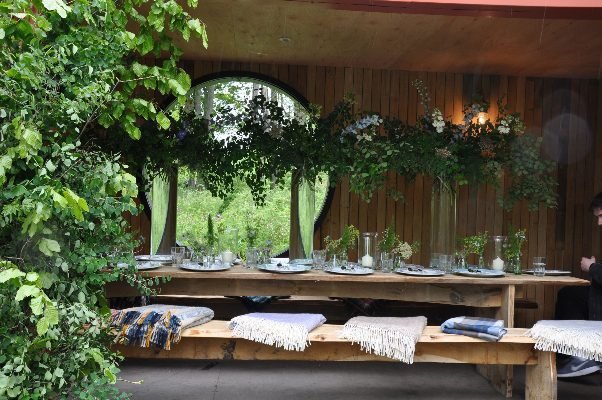I support local growers including Flowers by Season, a Yorkshire grower with the most beautiful blooms and foliage. They are reminiscent of the flowers in the garden of my childhood home: Antirrhinum majus, Alchemilla mollis and Eremurus stenophyllus – lots of cottage garden favourites.
I forage from the woodland at the Broughton Sanctuary, which throws up an abundance of foliage, twigs, sticks, berries, cow parsley and grasses.
Our business cards are made from recycled T-shirts from moo.com, the paper we use to wrap our flowers is recycled and recyclable and our plant-based tape contains zero plastic. Even the cleaning products we use in the studio are from Bower Collective, which vets products and suppliers according to sustainability criteria.
Inspired by Constance Spry
I have pledged never to use floral foam, which is made from synthetic, non-recyclable plastic and created using a combination of carbon black, formaldehyde and phenolic foam – all of which are toxic. I can’t believe that some colleges are still teaching floral foam techniques to students!
Instead, I opt for chicken wire and moss mechanics, with baked bean tins, fresh soup containers and jam jars placed to hold the water.
A huge inspiration and role model for me is Constance Spry, the British educator, florist and author of the mid 20th century.
One of the many ways Constance brought innovation to floristry was in the way she used balled chicken wire to hold plants and flowers in a way that resembled their natural growth.
Her unconventional designs continue to be a massive influence on today’s florists, and the fact she even used vegetables and weeds in her work fills me with joy – I love a bit of dock flower in a design!
You can’t eat an elephant
By using my imagination in wild and wonderful ways I can create new structures for my work and designs and keep pushing the boundaries.
I’m particularly proud of the mechanics I dreamed up for a woodland funeral I was asked to do earlier this year. I made a structure out of willow, criss-crossed and tied with jute string and filled tightly with moss. It worked perfectly and looked beautiful – plus it was completely biodegradable.
A great friend of mine often uses the phrase ‘you can’t eat an elephant’, and I agree. I am moving in the right direction and every little bit helps.
I will carry on learning and pushing the boundaries when it comes to how I approach my work; I’m certainly no guru, but I’m doing my best to save our beautiful planet in my own small way.
 Play Video about This Rock Might Just Save The World
Play Video about This Rock Might Just Save The World Play Video about Play 2 hours of rock
Play Video about Play 2 hours of rock Play Video about Play 2 hours of brook
Play Video about Play 2 hours of brook Play Video about Play 2 hours of sheep
Play Video about Play 2 hours of sheep











































